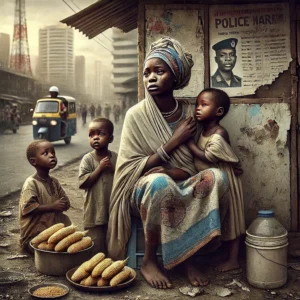
Despite global advancements, millions of Nigerian women continue to suffer under cultural practices that violate their dignity and rights. It is time these harmful traditions ended.
A Widow’s Struggle for Survival
In the stillness of her tiny rented shop in Lagos, Blessing Zion grills and sells roasted corn. Nine years ago, she lived in a modest police barracks apartment with her husband and three children. Then, in a single moment, everything changed.
Seven months pregnant, she received the devastating news of her husband’s death. What followed wasn’t just grief—it was a battle for survival. Six months later, she and her children were evicted from their home.
“They rented out the apartment. I had no choice but to find a way to survive,” she says, her voice carrying the weight of years of struggle.
Blessing attempted to claim her late husband’s benefits—money that could have provided shelter for her children—but each visit to the police office ended the same way.
“They claimed my husband was a ghost worker,” she says. “Then they spread rumors that I had already collected his money and squandered it.”
Blessing’s story is not unique. Across Nigeria, widows are denied their inheritance, thrown out of their homes, and forced into degrading widowhood rites. In some communities, a widow must drink the water used to bathe her husband’s corpse to prove her innocence. These traditions strip women of dignity and leave them destitute.
Silenced and Subjugated
The oppression of women extends far beyond widowhood. In Yoruba communities, the Oro cult dictates that women and non-initiates must remain indoors for days. Stepping outside during this period risks severe punishment—or even death.
“During this time, women are not seen, reinforcing the idea that they are lesser than men,” says 54-year-old Adenike Ajadi in an interview with Guardian Life.
For years, Esther Adams endured beatings from her husband. She was barely 22 when she got married, a shy young woman raised to believe that marriage was a woman’s ultimate purpose.
“I stayed because my mother told me that a woman must endure in marriage,” she says. “My sister also went through the same, but she survived it.”
Leaving an abusive marriage is unthinkable in many families. Women are told to “make it work,” to endure for the sake of their children, their families, and community approval. Many suffer in silence, their bodies bearing the scars of violence.
Education: A Right Denied
The silencing of women extends beyond the home. Education, a fundamental right, remains out of reach for many Nigerian girls. While some are pulled out of school to marry, others are simply denied the opportunity due to cultural beliefs that place little value on female education.
“I wanted to go to school, but my family didn’t see the essence of being educated,” says a 47-year-old pepper seller interviewed by Guardian Life. “They never thought about it. I regret it deeply. If I had gone, I know I would have been a great person today—maybe even a doctor.”
A 2025 Financial Times report emphasized that women’s education is key to fighting extremism in Africa. Without it, women remain vulnerable, trapped in cycles of poverty, early marriage, and dependence.
Reproductive Rights and Unsafe Abortions
Nigeria’s strict abortion laws put thousands of women at risk. Abortion is illegal except when a mother’s life is in danger, forcing many women into unsafe, life-threatening procedures.
A 2025 Guardian investigation exposed the struggles Nigerian women face in accessing safe abortions, calling for urgent legal reforms. Many women risk death at the hands of unqualified individuals, while others suffer lifelong complications.
Human Trafficking: A Growing Crisis
Then there is the horror of human trafficking—a crisis that continues to consume the lives of young women.
Every year, thousands of Nigerian women are lured with false promises of jobs, only to be trapped in forced prostitution.


















